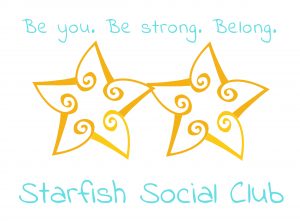Aspergers101 welcomes Stephanie Pepi, founder and director of Starfish Social Club as an underwriting sponsor to our newest resource: Aspergers101 FAQ page! Stephanie’s experience and passion led her to open a program solely dedicated toward helping children – adults challenged (if not crippled) with a lack of social skills. We look forward to her future contributions in the area of social development but thought you would like to get to know her, given advice to parents during a socially awkward outing and the rapidly growing non-profit to watch, Starfish Social Club.
Aspergers101: Tell us about Starfish Social Club.

Aspergers101: What areas and ages do you serve?

Aspergers101: Your resume is quite impressive, from special education administrator to the track coach for a special olympics team! What led/inspired you to launch Starfish Social Club?
Aspergers101: You work with school systems, what do you see as the most challenging social struggles for students with special needs?
Aspergers101: What is your advice to parents fearing social scenarios for their children diagnosed with High Functioning Autism or Asperger Syndrome?
My strongest pieces of advice are to prepare as much as possible and to use unexpected moments as teachable moments.
- Prepare as much as possible ahead of time. Tell your child where you are going, why, how long you expect to be there, and what to expect.
- When you get there, engage in a strategy called ‘read the room’. What do you notice? What are the expectations? What are most people doing?
- Don’t schedule social events with no plan. Center it around an activity or event. All our social outings involve going to a place to do a thing. Structure reduces stress. If you want to schedule a play date, where are you going to go? Maybe a park or themed event. Try to do it on neutral ground, not at someone’s house. The same is true for a ‘hang out’ for older kids. Base it around a structured activity like a trampoline park or movie.
- Give your child an out. What is the signal if they need a break? Where can they go? What can they do?
- Let your child come up with the goal so it’s meaningful to them. Sometimes I only focus on one thing with certain students. The goal for the day may be for him to keep his body in the group. Or for her to be flexible when her partner suggests a game. Or for him to follow the group plan instead of his own plan.
- After the activity, praise your child for all the things they did well, no matter how small. Did they greet other people? Did they share something? Did they ask someone a question?
- If it wasn’t super successful, don’t talk about the challenges. Save that for the next time you prep for something.
- Let your child have ‘me time’ after the activity. Social events can be stressful and ‘me time’ is both rewarding and stress relieving.
- Reward yourself as well. Supporting a kiddo with social learning challenges is tough work, and you are rocking it!
About Starfish Social Club:
Starfish Social Club provides small group, direct social skills instruction to students with social learning challenges, ages 4 through adult. Students learn new skills, practice in a safe environment, and engage with similar peers in leisure activities on a weekly basis. The only requirements for enrollment are the ability to converse with peers and a desire to learn and practice new skills. For more information or to schedule a free initial appointment for your student, please visit us at www.starfishsocialclub.org.
Starfish Social Club is an underwriting sponsor of the newest resource to Aspergers101 website: Aspergers101 FAQ. Access it HERE
by: Jennifer Allen
A graduate of Abilene Christian University, Jennifer had a long career in TV Broadcasting. Upon learning her oldest son Sam had a form of Autism called Asperger’s Syndrome, she left her career and became a full-time mother to both of her sons. Jennifer elicited the participation of her family and together they produced several independent programs including a children’s animated series titled Ameriquest Kids, as well as a documentary and book titled, Coping to Excelling: Solutions for School-age Children Diagnosed with High-Functioning Autism or Aspergers Syndrome. She formed the nonprofit Asperger101 to provide on-going free resources related to ASD at Aspergers101.com and has implemented the Texas Driving with Disability Program and continues to grow the statewide initiative today. She and her husband have recently retired to their property in the Texas Hill Country.

